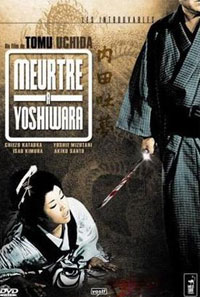 Killing in Yoshiwara (Hana no Yoshiwara hyaku-nin giri, Toei, 1960) just might belong on the first tier of classic samurai films.
Killing in Yoshiwara (Hana no Yoshiwara hyaku-nin giri, Toei, 1960) just might belong on the first tier of classic samurai films.
If it does fall sort of such heights as the best of Akira Kurosawa or Masaki Kobayashi, it is lower only by the smallest degree. It's period drama with a dynamite action conclusion with strong emotional content, & artfully breaks down the distinction between hero & antihero, naif & nihilist.
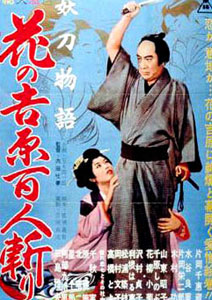 An infant abandoned at a shrine had a disfiguring birthmark on his face. An infant abandoned at a shrine had a disfiguring birthmark on his face.
An heirloom shortword was placed with the infant as the only clue to his samurai heritage. He is found & raised by an artisan couple, & grew up to become the master of a weaving concern.
Jiro Sano (Chiezo Kataoka) grew up a good man, financially well set, & loved by his company's employees. But he has remained unable to find a wife, due to his facial discoloration. He sets off for Edo for a matchmaking meeting.
While in Edo, he is cajoled into a visit to the Yoshiwara or pleasure district. Here female entertainers & prostitutes create illusions for clients. Any man who believes too much in the illusion is certainly naive, & a likely target for exploitation.
And since men so blithely exploit girls while embracing the lie that it's as good for her as it is for him, who is to say such a woman is wrong when an exploitative situation really does serve her purposes.
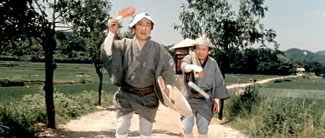 So here is a wealthy, lonely man, just rejected by a potential wife who was horrified by his birthmarked face. So here is a wealthy, lonely man, just rejected by a potential wife who was horrified by his birthmarked face.
He finds himself with women who seem to like him a great deal & not notice his appearance.
Otsuru (Yoshie Mizutani), a recently released convict, is a tough bitter young woman who looks great in a courtesan costume, but lacks the rigorous training.
As even geishas avoid the disfugured client, the convict is hired to cater to him. She's introduced as Tamazura, & he has no clue she is not a quality courtesan. He's sweetly impressed by her strange manners & her beauty.
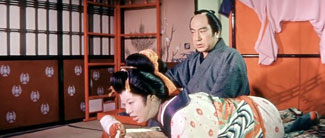 As she is not put off by his disfigurement, how could such an innocent man not fall for her? As she is not put off by his disfigurement, how could such an innocent man not fall for her?
Feeling for the first time in his life that a woman appreciates him, & blind to the numerous tragedies of Yoshiwara life, he returns home filled with illusions.
Many of the women of the Yoshiwara are back-biting & competitive, & they look down on Otsuru/Tamazura as a fake courtesan, really only a whore in borrowed clothes. She well knows herself to be low-ranking & ill-trained, & with bitterness still in her, she vows to become a tayu, such a high-ranking courtesan that all will be forced to respect her.
The girl who won Sano's sentiment feelings is personally in love with Eiji, a handsome young yakuza who takes advantage of her, as she takes advantage of Sano.
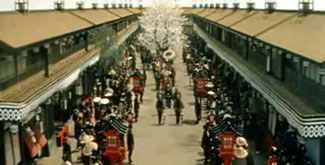 Having utterly fallen under her spell, Sano begins to squander his wealth on anything she desires. Having utterly fallen under her spell, Sano begins to squander his wealth on anything she desires.
To study to become a tayu, & to afford the costumes & accoutrements of the position, is an exceedingly costly path, something only a millionaire could survive.
When at last Sano is financially ruined & his eyes opened about the nature of "love" in a bordello, he seriously has only himself to blame.
He even tries to pawn the heirloom shortsword, an act that comes close to revealing his actual identity, though all he really learns is that the sword, for all its apparent value, is famous for baring a curse, & not even a pawnbroker will consider its purchase.
But as a broken man with nothing to lose, & only a cursed shortsword for legacy, he breaks down into rage. He raids Otsuru's "tayu coming-out parade" & cuts down the bordello's manager & his wife who were the true villains, but then goes after Otsuru who has become the object of his hatred & revenge.
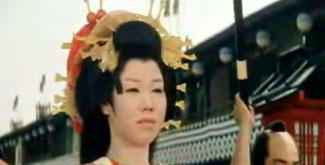 This violent climax is horrifying & tragic in its emotional content & its physical presentation, beautifully filmed, & wonderfully choreographed. This violent climax is horrifying & tragic in its emotional content & its physical presentation, beautifully filmed, & wonderfully choreographed.
Chiezo plays Jiro Sano as powerful when in a rage, by no means skillful with his shortsword & yet unstoppable due to the ferocity of what appears to be the psychotic break of a formerly gentle soul.
The fine script was by Yoda Yoshikata, one of the finest period-film writers. He collaborated with Kenji Mizoguchi on such classics as Sansho daiyo (Sansho the Bailiff, 1954), Ugetsu monogatari (Ugetsu, 1952) & Chikamatsu monogatari (The Crucified Lovers, 1954), as well as actioners in Shintaro Katsu's Akumyo tough-guy series (1961-1974), & Tadashi Imai's extraordinary Bushido zankoku monogatari (Cruel Tales of Bushido, 1963). Killing in Yoshiwara stands as one of Tomu Uchida's several achievements as a top director.
copyright © by Paghat the Ratgirl
|
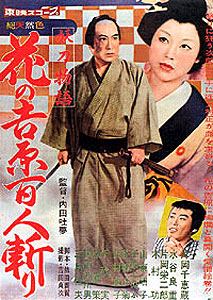

 An infant abandoned at a shrine had a disfiguring birthmark on his face.
An infant abandoned at a shrine had a disfiguring birthmark on his face. So here is a wealthy, lonely man, just rejected by a potential wife who was horrified by his birthmarked face.
So here is a wealthy, lonely man, just rejected by a potential wife who was horrified by his birthmarked face. As she is not put off by his disfigurement, how could such an innocent man not fall for her?
As she is not put off by his disfigurement, how could such an innocent man not fall for her? Having utterly fallen under her spell, Sano begins to squander his wealth on anything she desires.
Having utterly fallen under her spell, Sano begins to squander his wealth on anything she desires. This violent climax is horrifying & tragic in its emotional content & its physical presentation, beautifully filmed, & wonderfully choreographed.
This violent climax is horrifying & tragic in its emotional content & its physical presentation, beautifully filmed, & wonderfully choreographed.